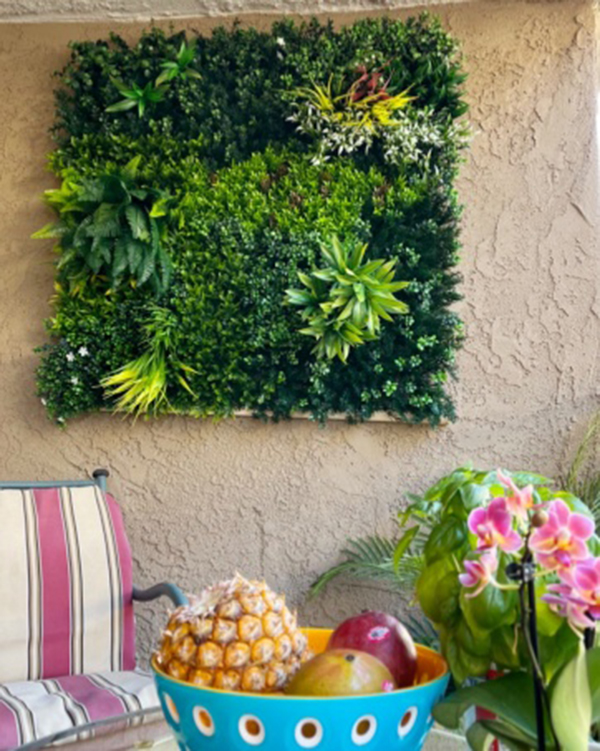Talent Development Needs for the 3D Artificial Vertical Garden Industry
The rapid growth of the 3D artificial vertical garden sector has created a pressing demand for skilled professionals capable of designing, installing, and maintaining these innovative systems. As cities increasingly adopt vertical gardens to enhance sustainability and aesthetics, the industry requires a diverse workforce with expertise in engineering, horticulture, environmental science, and project management. Addressing these talent gaps is essential to ensure the long-term success and scalability of vertical garden projects worldwide.

Cross-Disciplinary Engineering and Design Expertise
The development of 3D artificial vertical gardens relies heavily on engineers who can integrate structural, mechanical, and material science principles into functional designs. Professionals in this field must understand how to calculate load-bearing capacities for frames supporting synthetic foliage, especially in high-rise or seismic-prone areas. For example, expertise in finite element analysis (FEA) enables engineers to simulate stress distribution and identify potential failure points before construction begins.
Mechanical engineers play a crucial role in designing irrigation and lighting systems that optimize resource efficiency. Knowledge of fluid dynamics is necessary to create drip irrigation networks that minimize water waste, while an understanding of optics helps in selecting LED spectra that enhance plant colors without appearing artificial. Additionally, engineers must stay updated on emerging technologies, such as smart sensors for automated maintenance, to keep vertical gardens competitive in the market.
Collaboration between engineers and architects is another critical aspect of talent development. Professionals skilled in building information modeling (BIM) software can create 3D renderings that visualize how vertical gardens interact with existing structures, ensuring seamless integration into urban landscapes. This interdisciplinary approach reduces installation errors and accelerates project timelines.
Horticultural Knowledge for Synthetic System Optimization
While 3D artificial vertical gardens use synthetic materials, horticultural expertise remains vital for maintaining visual realism and ecological benefits. Professionals must understand plant morphology to select foliage shapes and colors that mimic natural species, creating aesthetically pleasing arrangements. For instance, knowledge of leaf venation patterns helps in designing synthetic leaves that reflect light authentically, enhancing the garden’s lifelike appearance.
Environmental scientists contribute to talent development by advising on the ecological impact of vertical gardens. They assess factors such as microclimate modification, air quality improvement, and biodiversity support, even in artificial systems. For example, studies on particulate matter capture by synthetic foliage can guide the design of vertical gardens in polluted urban areas, maximizing their environmental benefits.
Sustainability specialists are increasingly in demand to ensure vertical gardens align with circular economy principles. They evaluate the recyclability of materials used in frames and foliage, as well as the energy efficiency of irrigation and lighting systems. By promoting the use of recycled plastics or biodegradable components, these professionals help reduce the carbon footprint of vertical garden projects.
Project Management and Installation Proficiency
The successful execution of 3D artificial vertical garden projects hinges on skilled project managers who can coordinate multidisciplinary teams and adhere to timelines. These professionals must possess strong communication skills to liaise between engineers, horticulturists, and clients, ensuring that design specifications meet functional and aesthetic requirements. For example, project managers overseeing installations in commercial spaces must balance technical constraints with client preferences for branding or thematic elements.
Installation technicians require hands-on training in mounting vertical gardens on various substrates, such as concrete, steel, or wood. They must be proficient in using non-invasive anchoring systems to avoid damaging building facades, as well as in troubleshooting common issues like uneven weight distribution or irrigation leaks. Certification programs in safe scaffolding use and electrical wiring (for lighting systems) are often necessary to comply with occupational health regulations.
Maintenance crews form another critical component of the talent pipeline. These professionals must learn how to inspect vertical gardens for signs of wear, such as fading foliage or corroded frames, and perform repairs using approved materials. Regular cleaning schedules, involving eco-friendly detergents and low-pressure water sprays, are essential to preserve the garden’s appearance over time. Training in smart system diagnostics, such as interpreting sensor data from automated irrigation controllers, is also becoming increasingly valuable.
Soft Skills and Adaptability in a Dynamic Industry
Beyond technical expertise, the 3D artificial vertical garden industry values soft skills like creativity and problem-solving. Designers must think innovatively to overcome spatial limitations, such as integrating vertical gardens into narrow alleyways or irregularly shaped buildings. Adaptability is equally important, as professionals must stay abreast of evolving trends, such as the use of augmented reality (AR) for client presentations or the integration of vertical gardens into smart city initiatives.
Cultural awareness is another emerging requirement, particularly for global projects. Understanding local preferences for plant species or design aesthetics ensures that vertical gardens resonate with community identities. For instance, a project in a historically significant area might incorporate synthetic foliage that reflects regional flora, fostering a sense of place.
Continuous learning opportunities, such as workshops on new materials or sustainability certifications, help professionals remain competitive. Employers increasingly prioritize candidates who demonstrate a commitment to upskilling, recognizing that the industry’s rapid innovation demands a proactive approach to talent development.
Conclusion: Building a Future-Ready Workforce
The 3D artificial vertical garden industry’s expansion relies on cultivating a diverse, skilled workforce equipped to tackle engineering, horticultural, and project management challenges. By investing in cross-disciplinary education, practical training, and soft skills development, stakeholders can bridge current talent gaps and foster innovation. As vertical gardens become a staple of sustainable urban design, a well-prepared workforce will be instrumental in driving their adoption and ensuring their long-term success.
Contact: Amy
Phone: 86-15311787313
E-mail: info@foszmac.com
Whatsapp:86-15311787313
Add: Fengtai District, Dacheng Road, No.24 Building, Room 203, Beijing, China